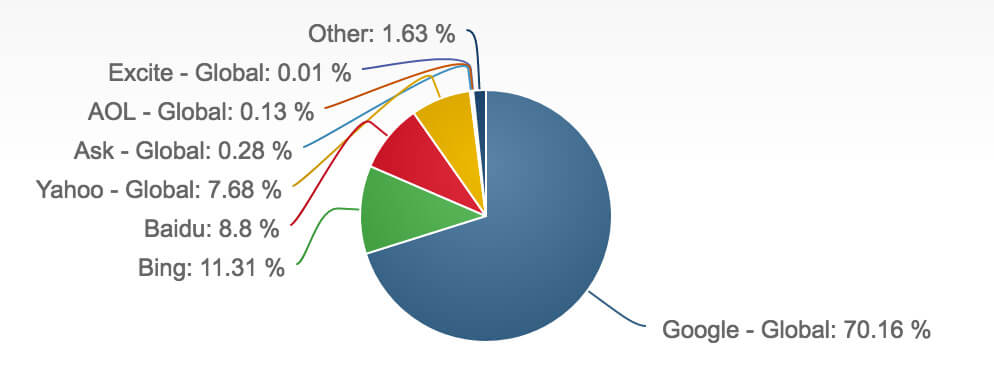The Major Google Algorithm Updates Explained
oogle is undoubtedly the best search engine.
Conduct any search and you get a list of results in an instant that closely match your query. Other search engines are comparable but none come close in terms of quality. For largely this reason, Google continues to lead in global market share:

How is Google able to maintain such a significant market share?
One reason is because the algorithm is constantly being updated to keep spam out of the results. Practices that were once used to game the system (e.g. keyword stuffing, spam link building, etc.) are no longer effective. Engaging in them may work initially but they will eventually result in a ranking penalty.
Here we take a closer at some of the major algorithm updates that Google has released in recent years and what they mean for your business.
Google Panda
There was a time when all it took to rank a site was including the right keywords.
But eventually the search results were filled with low quality sites or sites that scraped content from other sources. To combat the increase in spam, Google released the Panda update in early 2011. Sites that were once relying on keyword stuffing or scraping content were soon penalised and higher quality sites were rewarded with higher rankings.
The update makes sense from both a user standpoint. If you conduct searches and aren’t able to find what you are looking for, you would likely turn to other sources for your information.
Bottomline: The quality of your content matters more than ever. All it takes now is a few pages of low quality or duplicated content to have your site penalised. Focus on creating content that provides value to your visitors.
Google Penguin
Links are easily one of the most important ranking factors.
But many marketers and business owners began taking advantage of this fact by spamming thousands of links to their pages. As you might expect a good deal of these sites were low quality but many began outranking higher quality sites. Again, Google took steps to penalise sites that relied on such tactics to manipulate their rankings with the Penguin update.
Buying links from questionable sources or using automated tools to build links en masse are strictly against the Quality Guidelines. If your site is not ranking, this could be why.
Bottomline: Links are important in terms of search engine rankings but quality matters. A link from a relevant source will carry far more weight than a spammy link. Focus your efforts on acquiring more of the former.
Google Pigeon
Most consumers use search engines to find local information. So it makes sense for Google to pay equal attention to local search. The Pigeon update is aimed at providing more relevant and accurate local search results. The update is now closely tied to ranking signals for traditional searches.
Another change is the change to distance and location ranking parameters. In other words, users searching for a nearby restaurant wouldn’t see results that are halfway across the country.
Bottomline: If your customers are primarily local, make efforts to optimise your site for local search. Include the city name where your business resides in throughout your content and build links from local directories.
Google Mobile Update
Google strives to deliver an optimal user experience for all its visitors whether they are searching from a desktop or mobile device. With more consumers now searching from mobile devices, Google released an update that makes mobile-friendliness a ranking factor. Sites that aren’t mobile friendly will see their rankings drop in the mobile search results.
Use the Mobile-Friendly Test to check if your site is mobile friendly. If it’s not, you could be missing on traffic to your site. Responsive design is the recommended configuration. This means that your site dynamically changes to fit all screen resolutions including smartphones and tablets.
Bottomline: Make sure that your site is mobile friendly. There are different approaches but responsive design is the easiest to implement. It is also the configuration that Google recommends.
Conclusion
Google is constantly releasing new updates to its algorithm to deliver more relevant results. Make sure to follow all best practices and stay away from questionable tactics such as keyword stuffing. Otherwise you risk getting hit with a ranking penalty.
